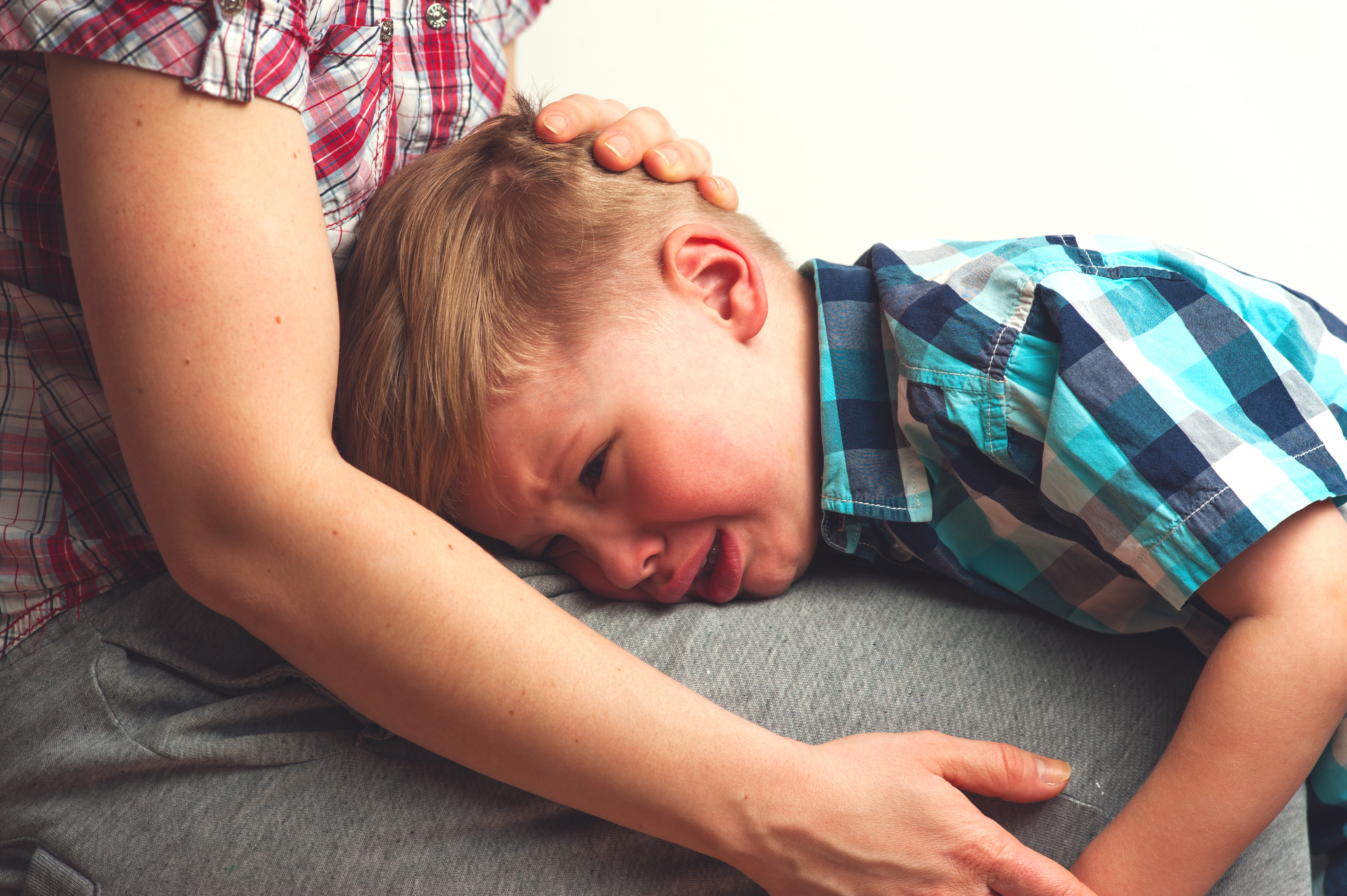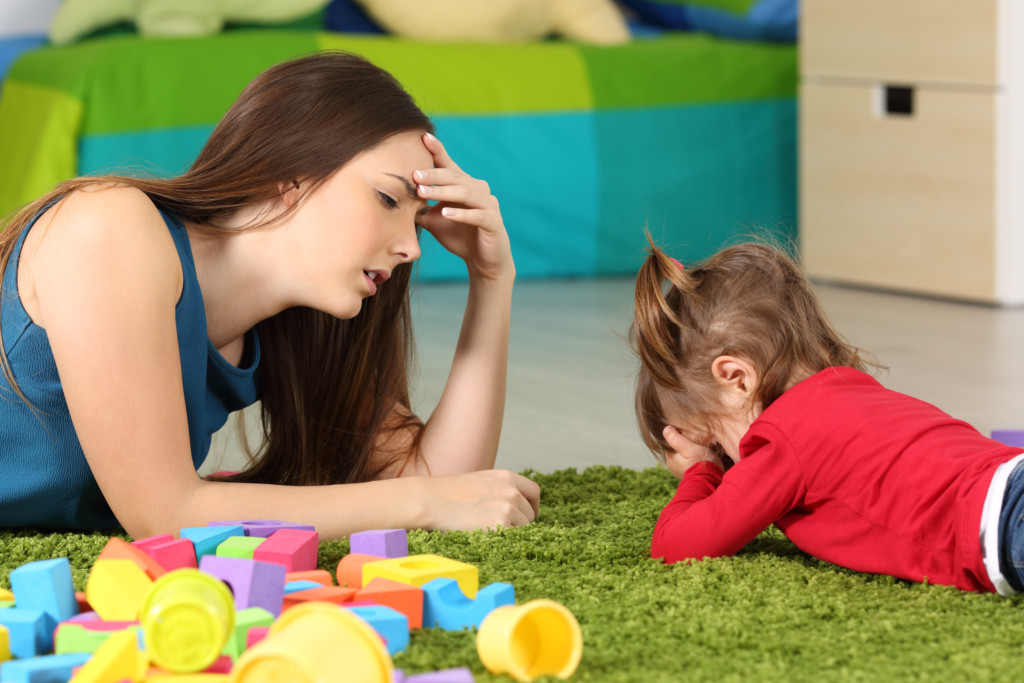 Children develop their self-image largely through their parent’s reflections. Children and teens are continually developing their self-image, and their biggest reflection comes from their parent. When children trust that their parent will overall be kind and fair, this allows them to continue to be open and honest, to take responsibility and to do the right thing. Children don’t want to lie, to hide their feelings or their actions, they want to feel safe to share anything and everything that bothers them with their parent/s. The good news is that much of the unhealthy issues that are considered normal and unavoidable can indeed be avoided when the open lines of communication can be maintained.
Children develop their self-image largely through their parent’s reflections. Children and teens are continually developing their self-image, and their biggest reflection comes from their parent. When children trust that their parent will overall be kind and fair, this allows them to continue to be open and honest, to take responsibility and to do the right thing. Children don’t want to lie, to hide their feelings or their actions, they want to feel safe to share anything and everything that bothers them with their parent/s. The good news is that much of the unhealthy issues that are considered normal and unavoidable can indeed be avoided when the open lines of communication can be maintained.
Emotional safety allows your child to be honest and not lie, to own and take responsibility for mistakes. Children need to feel emotionally safe in their family, which means that they can trust that their feelings and thoughts will be responded to with the sensitivity and respect that they deserve. This level of trust is what allows children to be honest about what they really feel and really need It’s equally what allows them to be honest about their wrongdoings and what’s needed for your child to not resort to lying as a defensive tactic. This level of emotional safety allows children to identify and be able to express that which they feel uncomfortable about, which is an important aspect of protecting children from different forms of abuse.
A child who is often afraid of criticism and rejection from their parent tends to put a lot of energy into hiding their wrongdoings, which can result in lying, keeping secrets and being highly defensive and reactive. If a child’s mistakes and upsets tend to result in being spoken down to, harshly criticized, being shut down (like being told to calm down or sent to their room) instead of being met with care and support, the child starts to internalize that it’s not okay for them to show their feelings. Even if they appear not to be upset, inside something often shuts down and they can become increasingly insecure. It’s not easy for parents to know how to best guide their children especially when the child’s behaviour has an upsetting effect on another, yet there is a whole set of communication and relationship skills that parents can develop which help them maintain the connection even when disciplining (teaching) their children.
Children need to feel secure that their parent sees and believes in their goodness and their potential through all the challenges, that the relationship is more important than the learning edges and mistakes. Children are highly dependent on their parent’s love, acceptance and approval. When a child loses their parent’s approval, they lose an important motivation to do the right thing. Kids will work hard to maintain their parent’s warmth and love, but most kids will fight against having to earn it because of the lack of unconditional warmth and love can be very wounding.
Children are much more vulnerable to stress in the family and conflicts with their parent (or between parents) than previously recognised. Until recently, it was only the more extreme impacts of screaming at or hitting children that were considered to negatively affect the child’s confidence, social skills and trust in their parent. Yet, slowly but surely society is recognizing (based on a huge volume of research) that children need to feel safe and secure not just physically, but emotionally as well. It’s sadly very easy for a parent to cause their child to feel afraid of their parent’s anger or condemnation. In fact, many parents still believe that it’s important to instil fear in their child, unaware that cooperation is not just possible, but much more likely and freely given, when the child feels secure and safe with their parent. When a child learns to fear their parent, it comes at a huge cost to the child’s sense of security and self-confidence, and a huge cost to the parent-child connection. It’s very important that a child can feel emotionally safe in their home, that they don’t fear their own parent.
When children live with the fear of being spoken to harshly, they generally become defensive and spend a lot of energy deflecting criticism and tend to feel generally unsettled and unsupported. When children feel unsafe emotionally, they often can’t quite identify or clearly express the true source of their frustrations, but they often tend to complain about all sorts of things that their parents do in an attempt to express those underlying frustrations. This is confusing for child and parent because the parent may feel that they are doing everything for their child, meeting all their child’s (at least physical) needs and yet their child is still unsettled, grumpy and ungrateful. When children feel shut down by their parents, it creates barriers to open communication and affection in the parent-child relationship, which sooner or later tends to manifest as aggression, sulking, defiance, refusal to listen or cooperate and many other problems.
Crying keeps the heart soft. The child who has been discouraged from showing their true feelings and letting themselves talk or cry to release those pent up feelings is more likely to act out those feelings through unhealthy behaviours like aggression towards others or they may shut down, becoming aloof, bored, sarcastic or passive-aggressive in other ways. When parents learn about the importance of giving permission to the child’s whole range of feelings, they quickly realize the importance of their children remaining open, honest and vulnerable with their feelings and the value of a child seeking support and listening from their parents. Children return to balance when they have big releasing cries within their parent’s loving support.
Control patterns. When parents first come to our Peaceful Parenting Courses, they often identify that their child has learned to not cry as much as they need to, they’ve sadly learned to hide their vulnerability. The child may have developed, what Aletha Solter of the Aware Parenting Institute has termed a control pattern, (all her books are available through our books page). A control pattern is any method that a parent uses to consistently distract a child from their upset (for instance food or screens), which the child, in turn, learns to associate as their need when they become upset. The child may cry because they have a need for connection with the parent, but when the parent consistently directs the child then towards food, screens or a pacifier, the child learns to identify the food, screen or pacifier as their need and misses out on identifying that they need some warm connection with their parent. As well as the child becoming confused about their true need, the distraction can result in them blocking their expression (talking/ crying / venting) and hence misses the opportunity to release and process those feelings.
As this pattern becomes habitual, instead of allowing themselves to be insistent on gaining their caregiver’s attention or having a cry to release their frustration, they may demand comfort food or access to a screen or their pacifier (as just three examples but really anything can become a control pattern when needs become confused). The most common control patterns are food, drink, entertainment, cuddly toys, pacifiers but it could be a habit of talking very fast. Children can have a great and healthy affection for their cuddly toys, enjoy their food greatly, have a balanced relationship with screens, but if the child desperately seeks these out as a way of shutting down their vulnerable feelings and blocking their cries, or seeks these things instead of communicating their need for warm connection and affection, then a control pattern may have developed. If a parent has tended to dismiss, distract or reason their child out of expressing their upset feelings, and has tended to direct their child towards these other methods of soothing, then even though the child appears pacified for a while, they may still hold the frustration of the deeper needs for connection or emotional release that have not been met. When this becomes habitual, the child may tend to show the more surface defensive emotions like anger and defiance or become excessively clingy, but are less likely to express their vulnerable emotions of sadness, grief, disappointments or fears. The child learns to seek “comfort” from this same means with a sense of desperation, yet the tensions remain beneath the surface and will soon surface again.
To encourage your child to open up and slow start to resolve any control patterns they’ve developed, it helps to create for them a culture between you of emotional safety. Unwinding a control pattern works best when it is done in a very slow gradual gentle way with the focus on better identifying and helping the child to meet their deeper needs. All the articles as well as our eCourses will help you gain the necessary tools to change the patterns of relating and hence deepen your child’s sense of emotional safety and security.
Ways that we (often inadvertently) Shut our Children Down
Traditional parenting approaches tend to focus on changing the child’s behaviour without fully exploring the underlying feelings that drive the behaviour. Yet coercing children to change their actions through the threat of punishments and imposed consequences fails to address the underlying feelings and unmet needs, puts children in a defensive position and generally comes at a cost to the relationship. When children do as they’re told, without their feelings, wishes and wants being taken into consideration, they are being conditioned to do what others believe is best. (Read Genevieve’s article The pitfalls of obedience training)
Consequently, they don’t spend as much time developing their ability to identify, feel and express their feelings honestly. Hence, they may learn to minimize, deny, ignore and generally become conflicted about trusting their feelings and needs. In other words, they can become emotionally quite confused and “mixed up”.
Another cost is the effect on the relationship between child and parent because the child feels coerced much of the time, the trust is compromised. If a parent asks their child, “how do you feel about yourself when I criticize you/ tell you that you have to do what I ask without complaining?” (assuming the child can trust that it’s safe to be honest) they will often hear the important truth. Children have a huge urge to tell us the truth when they can trust that it’s safe to be honest and what they share will be respected and not used against them.
We need to protect, respect and honour our child’s trust in us. When our children show us how they really feel and what they really think, they are giving us an insight into their inner world, they give us the opportunity to listen to them, to understand them and to help them. When we respond in ways that give them the message that we’re not really listening, not really caring about their feelings or otherwise denying, dismissing or being critical of their feelings, we compromise our child’s trust in us. If you identify that this trust has started to diminish, it may need rebuilding, click here for some guidelines on repairing the connection.
Common messages that parents give their child that tend to shut their child down emotionally:
- superiority shuts kids down: giving the message that you know better, they should listen to you because you’re older and wiser (which may be true much of the time, but your child’s perspective also needs a voice)
- minimising their feelings: you think that their thoughts and feelings are being exaggerated “are you sure it was THAT bad?!” (it’s normal for people of all ages to exaggerate when emotions are strong, especially if they don’t feel heard, acknowledged or believed)
- imposing positivity to minimise their feelings; you believe they shouldn’t complain, “oh come on, stop focusing on the problems, don’t you appreciate all that I do for you!”
- treating them with distrust; you don’t trust their motives; “oh yeah, I’m sure you weren’t so innocent either”
- using humiliation to minimise their feelings; you think they’re making a mountain out of a molehill “don’t make such a big deal out of things. Don’t take things to heart so much, you’re too sensitive”,
- harsh judgment of their vulnerability; you think they should be stronger; “why do you let them get to you, you’re bigger than that!”,
- harsh judgment of their insecurity; you think they should be more responsible and more in control; “why haven’t you already sorted this issue out?! I expected more of you”,
- not having their back; you feel more empathy for the person they’re annoyed with than them; “it’s hard for teachers dealing with a big class of 30 kids”
- harsh judgment of their imperfections; you think they have caused the problem and don’t deserve empathy; “you only have yourself to blame, if you had …”,
- blaming them for their struggles; you think they’re causing everyone to be unhappy because of their thoughts and feelings; “we were all having a nice time until you got upset!”
- lack of acceptance of who and how they are; you don’t like their thoughts and feelings and wish they were different; there’s a difference between showing the feelings you have in response with “I” statements as opposed to “why would you feel like that? Surely you should consider …. “
- conditional love and acceptance; you don’t like the sort of person they are when they show you these thoughts and feelings,
- blaming them for the feelings you struggle to manage; you can’t cope with their thoughts and feelings, you feel upset, confused, overwhelmed, angry, resentful and you resent being made to feel like this, (as opposed to having feelings in response but showing that you value their honestly and acknowledge their feelings EVEN though it’s hard for you.)
Listening to and supporting our child’s disappointments
Our children tend to live in a world of greater emotional safety and hence security when we parents can stay connected to them as they express their feelings, cry or even tantrum about the things that upset, disappoint and frustrate them. Children need and benefit from their parent’s advice and guidance, but are much more receptive to it when they feel confident that they’ve been heard and understood. Avoiding shutting children down helps them grow up with permission to show, share, release and resolve hurt feelings and feel loved and supported in the process.
Listening with empathy heals a child’s scared, lonely and angry feelings. Parents think they need to fix their child’s problems, but much of the remedy is in the listening and helping the child feel that their feelings are understandable. Most parents were not themselves listened to during their upsets as children and these unresolved feelings can surface when their child is upset. Parents can develop their ability to bear, listen to and care for their child’s big feelings by gaining supportive listening for themselves.
Offering love and listening to children while they show us what worries and upsets them, supports them to listen to their own feelings, to trust their own feelings. They gain the opportunity to work through their problems and naturally start to feel stronger and gain valuable insights. And, fortunately, children with parents who continue to listen to and validate their feelings grow up to be compassionate towards themselves, others and their planet.
Subscribe to our newsletter to receive other articles and updates.
You might also like to read:
Empathy makes difficult feelings much less difficult
Can you maintain healthy boundaries? Are you modelling healthy boundaries?
Why we explode and how to prevent it How can I become less impatient and more patient? Develop self-regulation skills.
Dealing with anger in the family and in yourself









Genevieve, you are gifted.
Thank you Katharine, I’m just so very passionate about helping parents gain deeper insight into their child’s and their own inner world, as I believe that this insight is what makes it so much easier to maintain our commitment to more peaceful ways of relating.
I love your articles and have try to embody the language and parenting techniques. Lately our 4 year old has been really testing and knows when she is . She screams and cries when she doesn’t get her way and it is really LOUD!!!! For about three months, I was hugging and holding her, telling her I can understand her better when she talks but the behavior still persists. She can stop and in a split second smile at us. I have not sent her to her room but this weekend we have been saying, we are not mad just go take a minute upstairs and come down when you are ready to talk. She comes down and apologizes but I don’t want her to feel guilt . I also can’t take the constant scream and drama 10 times a day over really little things. We talk about how it’s hard going with the flow and how I know what it feels like when things don’t go my way. Any suggestions?
[…] speak and act in ways that we regret, and as long as we have the self-awareness and humility to identify and admit our mistakes, our kids do learn the […]